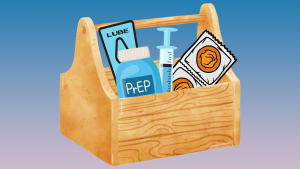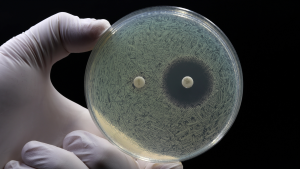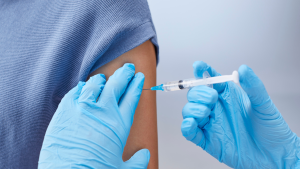
Your Safer Sex Toolbox
Explore ways to make sex safer and communicate with your sexual partners about your expectations and boundaries.
Doxy PEP (doxycycline post-exposure prophylaxis) is a strategy that involves taking an oral antibiotic after condomless sex to prevent chlamydia, gonorrhea, and syphilis, three very common sexually transmitted infections (STIs). Doxy PEP can be a component of someone’s safer sex practices. Safer sex practices (like using condoms and having recommended tests) are also important. Doxy PEP has been proven to reduce the risk of getting bacterial STIs. Many people who take it say it gives them peace of mind in their relationships and sex life, but you don’t have to just take our word for it. We sat down with Oscar Alexis, Efthimios, and Maxfield Haynes to talk about doxy PEP.
Doxy PEP is an important prevention tool for people who may be at risk of bacterial STIs, but the users we interviewed told us there were other reasons to consider. Oscar told us that using doxy PEP can give patients a sense of relief and reduce worry about STIs from unprotected sex. Oscar said, “I think it can just give someone like a bit of an ease of mind.” Maxfield went as far as to say, “I think that doxy PEP is one of the most amazing tools in modern medicine…it drastically reduces my worry about contracting something from a potentially risky encounter.”
As Oscar pointed out, however, doxy PEP is meant to complement prevention methods like condoms. He noted, “I should also reiterate that it [doxy PEP] doesn’t replace other safe sex practices.”
Talking to your health care provider about sexual health, STI prevention, and doxy PEP should be easy, but we know anything related to S-E-X can feel awkward. In fact, all of the doxy PEP users we interviewed mentioned this. Efthimios said it’s understandable “that some people might feel awkward or nervous about bringing up sexual health issues in general with their health care provider.” They suggested writing notes about what you want to talk to your provider about before the appointment.
Similarly, Oscar suggested that having some information about doxy PEP available to show your provider could help. Especially if you are unsure about how informed your provider is on sexual health. Click here for a resource that you can share with your healthcare provider about doxy PEP.
It is also important to have a provider you feel comfortable with. Oscar said, “Something I’d remind listeners and viewers is to not be afraid to be firm in your knowledge…sometimes you may have to educate and gently push your doctor to being open to new information.” Oscar also acknowledged that you might need to get a new provider and added, “I actually ended up switching to another provider who knew exactly what I was talking about when I said PrEP and doxy. So, if it’s possible, find a different provider who is well-informed.”
Doxy PEP has been proven to reduce the risk of bacterial STIs (chlamydia, gonorrhea, and syphilis). This matched up with the experiences of the doxy PEP users we interviewed. Maxfield says that they “haven’t tested positive for an STI in over two years because of doxy PEP.” Efthimios said they “haven’t really had anything since I started using it.”
All three of the people we interviewed mentioned some side effects of doxy PEP, including the chance of it upsetting their stomachs. Maxfield said, “It can have some negative effects on your gastrointestinal system, but I find that in order to mitigate that, I just make sure that I eat something.” None of the patients we interviewed mentioned any side effects severe enough to influence their decision to take doxy PEP.
One thing that came up in our interviews was the need to make healthcare spaces more welcoming for all people. Oscar, Efthimios, and Maxwell all highlighted the importance of having inclusive and educated health care providers. Efthimios put it this way, “it’s important [for health care providers] to always listen and then assess what could maybe be risky, what could be prevented, what could be improved, [and] how someone could be helped. So, no judgment and [being] open for everybody and talk about anything you want to talk about.”
Maxfield emphasized that sexual health should be destigmatized, saying, “we can all find a little bit more comfort in knowing that sex is not a dirty thing. I think if we all kind of adopt that mindset and just say, hey, we all do this. We are, we are human beings. We love love. And love should be free, not something that is seen as shameful.”
Doxy PEP is an effective tool to help prevent bacterial STIs. Studies have shown that doxy PEP can reduce the risk of contracting chlamydia and syphilis by over 80% and gonorrhea by around 55%. When combined with other safer sex practices, including condoms and regular STI screenings, Doxy PEP can be an important part of someone’s safer sex toolbox.
Talking to the people who use this new prevention strategy really drives home the difference it is making in real people’s lives. Maxfield summed it up very well when he said, “I find that if I have a tool that can help assure my own safety, I feel much more liberated to actually go and live my life to the fullest in a way that I don’t think that previous generations could.”
To find a provider to ask if doxy PEP is right for your, search for a provider here or reach out to your primary care provider.

Explore ways to make sex safer and communicate with your sexual partners about your expectations and boundaries.

A new study is raising concerns that doxy PEP, a strategy of taking medication to prevent STIs, might already be contributing to the rise of antibiotic-resistant bacteria.

There’s potential good news in gonorrhea prevention as a series of studies suggests that certain meningococcal B (MenB) vaccines can reduce the risk of gonorrhea.

Two studies published in this month’s JAMA Internal Medicine offer encouraging findings about the use of Doxy PEP.

Doxy PEP involves taking an oral antibiotic after condomless sex to prevent bacterial STIs. Research has shown that this can reduce the possibility of contracting chlamydia by 88%, syphilis by 87%, and gonorrhea by 55%.

Doxy PEP is the strategy of taking the antibiotic doxycycline after condomless oral or anal sex to prevent chlamydia, gonorrhea, or syphilis.
ASHA believes that all people have the right to the information and services that will help them to have optimum sexual health. We envision a time when stigma is no longer associated with sexual health and our nation is united in its belief that sexuality is a normal, healthy, and positive aspect of human life.
ABOUT
GET INVOLVED
ASHA WEBSITES
GET HELP
© 2026 American Sexual Health Association
We need to know if we can keep you company during this visit. We are useful for making this site work.
We use cookies to enhance your browsing experience. You can choose which cookies you want to accept.
Necessary cookies help make a website usable by enabling basic functions like page navigation and access to secure areas. The website cannot function properly without these cookies.
| Cookie | Provider | Purpose | Expiry |
|---|---|---|---|
digiconsent | This website | Stores your cookie consent preferences. | 1 year |
wordpress_logged_in_* | WordPress | Identifies logged-in users and their authentication details. | 14 days / Session |
wordpress_sec_* | WordPress | Stores authentication details for secure areas. | 14 days / Session |
wp-settings-* | WordPress | Stores user interface customization preferences. | 1 year |
wp-settings-time-* | WordPress | Stores the time when wp-settings cookie was set. | 1 year |
Analytics cookies help us understand how visitors interact with our website by collecting and reporting information anonymously. This helps us improve our website.
| Cookie | Provider | Purpose | Expiry |
|---|---|---|---|
_ga | Registers a unique ID to generate statistical data on website usage. | 2 years | |
_ga_* | Used by Google Analytics to store and count pageviews. | 2 years |
Marketing cookies are used to track visitors across websites. The intention is to display ads that are relevant and engaging for the individual user.
Functional cookies enable the website to provide enhanced functionality and personalization. They may be set by us or by third party providers.